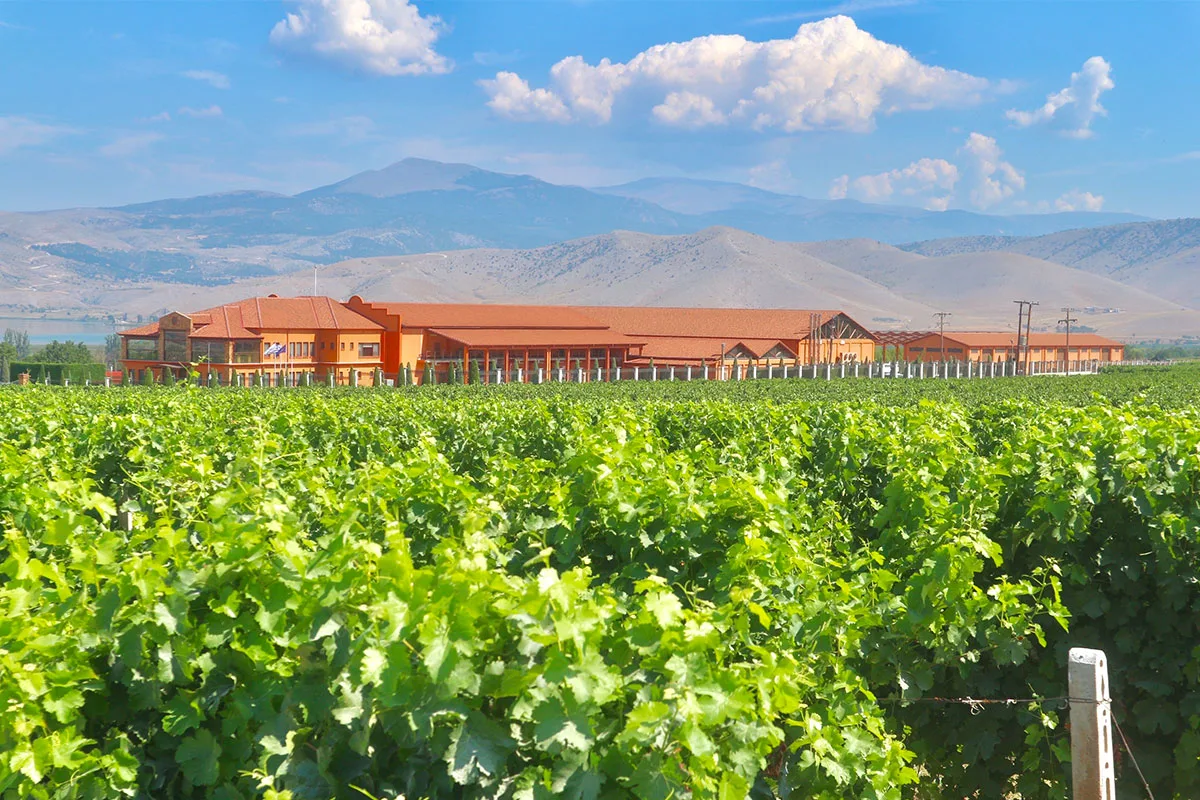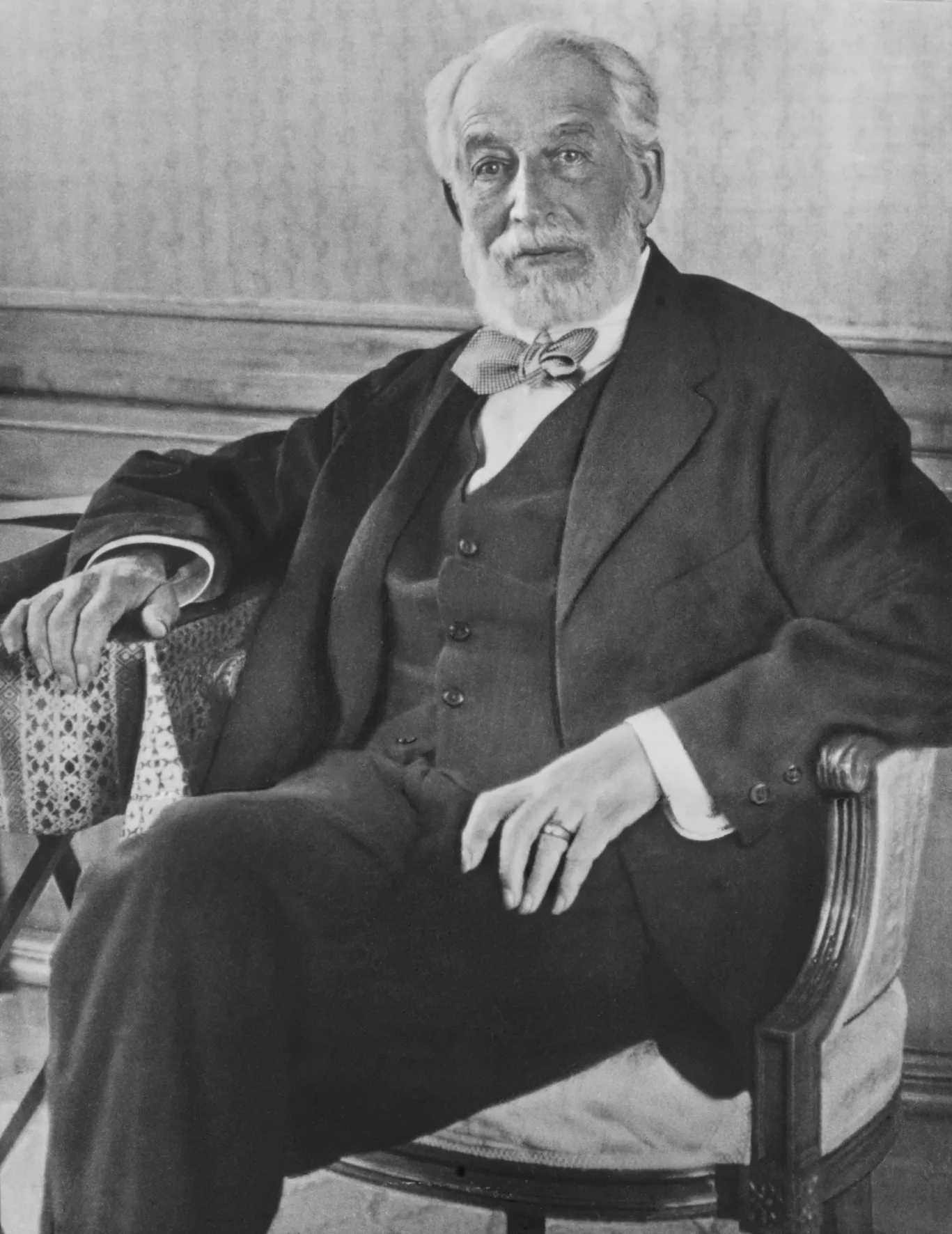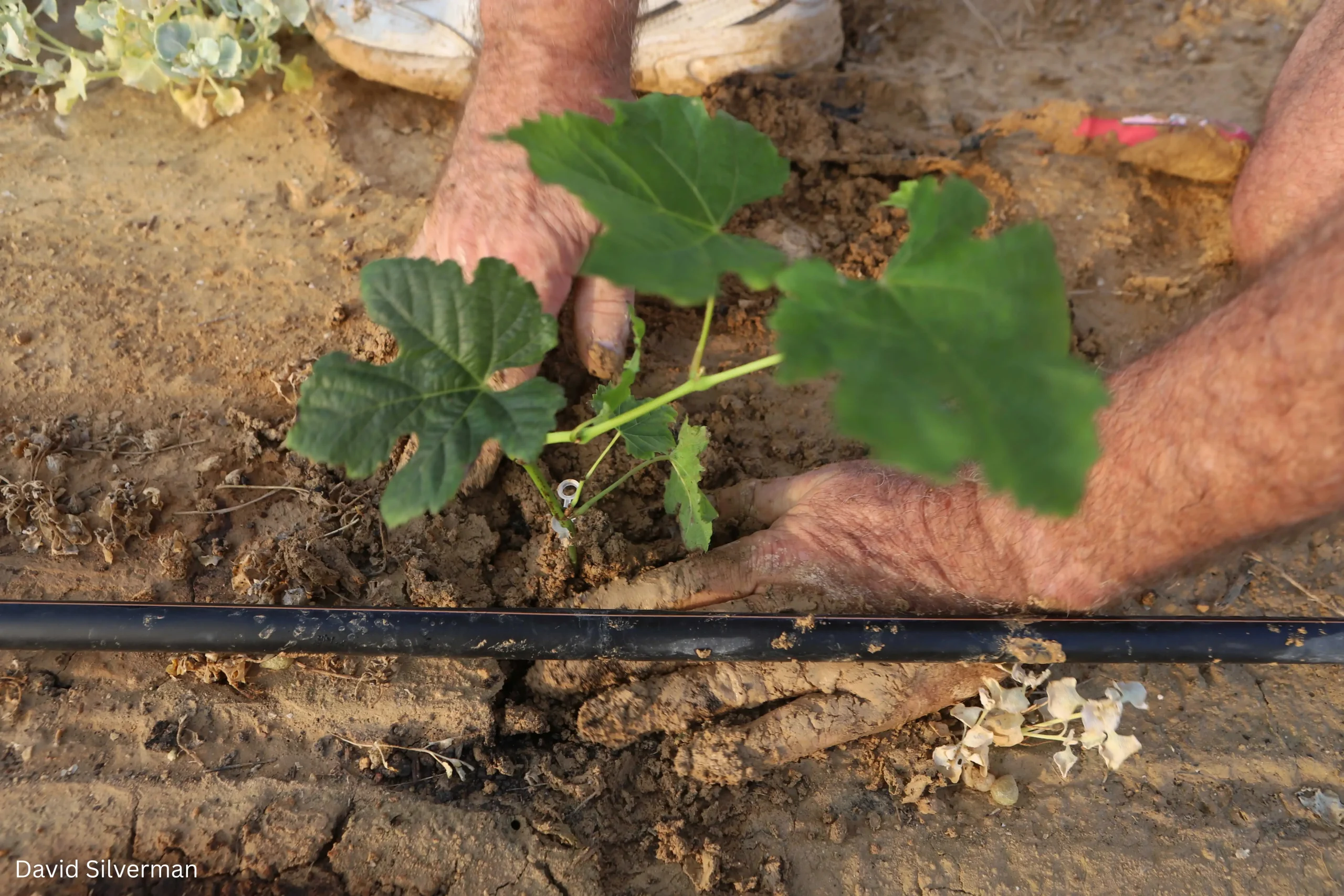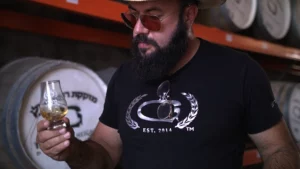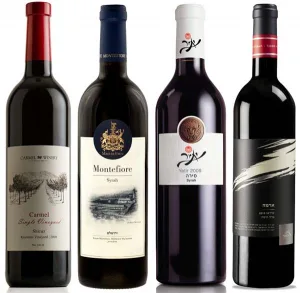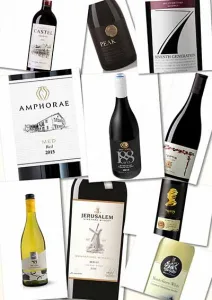The wine world tends to divide itself into the ‘New World’ and ‘Old World’. Israel finds itself as part of the Eastern Mediterranean wine region. If you add Georgia and Armenia to the countries of the East Med like Cyprus, Greece, Lebanon, Turkey and Israel, then you have the basis of what may be described as the ‘Ancient World’. Though the wines from these countries may be considered exotic today, the wine drinker in Biblical and ancient times, would have been quite familiar with them. The Ancient World was cradle of the grape and this was where the birth of wine culture took place. It was then the France and Italy of those times, both in terms of quantity and quality.
In truth, the Ancient World has not made great wines for 2,000 years, but in the last twenty years there has been a real revival. It has developed into a fascinating and dynamic mosaic of countries, whose wine story began thousands of years before the vine and wine arrived in modern Europe. Nowhere is this truer, than of Greece. The Ancient Greeks were in the Holy Land for a period before the Roman Empire, and their hedonistic attitude to wine greatly influenced the strict, reactive rulings of the Rabbis to build in safeguards around the production and consumption of Kosher wine. The wine tastings of the Ancient Greeks were amusingly known as ‘a Symposium’, a word adapted to mean something different today.
The roots of a modern wine industry sprouted towards the end of the 19th century and for much of the 20th century, large wineries like Achaia Klaus, Boutaris, Cambas and Khourtakis, produced wines more attractive for their price than quality. As a young man in London, I remember the liter bottles of Demestica on the back shelves of fast food joints. These were not good wines. Retsina, the wine flavored with pine resin, was what you tasted on holiday. It was usually oxidized without a smidgeon of fruit, and had a flavor more reminiscent of paint stripper than wine. The image of the wine was at rock bottom.
Domaine Porto Carras was the first winery that brought quality wine to Greece, using the finance of a rich, ambitious owner and the expertise of the game changing winemaking consultant Emile Peynaud. This was the person who changed the way Bordeaux wines were made virtually single handedly. He was incredibly influential. The young winemaker of Porto Carras was Evangelos Geravassiliou, who became one of Greece’s most famous winemakers and a played part of the revolution that followed. In the nineties substantial changes took root. Small wineries sprung up all over in different regions. Local varieties were proudly explored and put up front. The result of the new pursuit of quality, authenticity and individuality, was that the large wineries followed suit with their own rejuvenation.
The story is similar in Israel. Here Carmel Mizrachi was the large dominating winery, producing pretty poor wines. The image of Israeli wines was lower than rock bottom. The Golan Heights Winery pioneered a change to quality. The small winery revolution was led by wineries like Domaine du Castel and Margalit Winery. At the turn of the Millennium, the larger wineries like Carmel and Teperberg began a revival of their own, resulting in rebranding and far better wines.
Despite all the positive changes, for years both Greece and Israel continue to suffer image problems in export markets. Many thought Greek and Israeli wines were only for their respective ethnic markets. Greek wines were assumed to be made only for ex-patriots and the country’s image was defined by Retsina. Likewise many believed that Israeli wine was sweet, red and Kosher, primarily for Jewish consumption. I suppose it is only in the last twenty years that both countries have started to gain the international recognition they deserve.
As the world contracts, with more and more wines made from only six or seven global grape varieties, in a conformist international style, Greece is a rare gem. Though it is a country with a wine history longer than Europe and the New World, it is regarded as relatively new in the corridors of quality wine. With over 300 indigenous varieties and enormous variety of climate and terroir, it is a country of boundless interest to the wine lover, especially for one who is looking for new experiences. I think it is fair to say that Greece has a reputation for making better whites than reds, and in Israel we are more appreciated for our reds more than whites, but in both countries the gaps are closing. Greece dwarfs Israel in terms of vineyards, production and consumption.
I have always had a personal love affair with Greek wines. My own Greek awakening came in the late 1990’s from new small wineries like Kir Yianni, Gaia, Gerovassiliou and Skouras. I tasted their wines at exhibitions and knew something exciting was afoot. Yet, when I talked about Greek wines in those days, people looked at me with blank looks. It would infuriate me to visit Greek restaurants, usually in England or the USA, which just did not list Greek wines! Such was the lack of pride and respect.
It has taken a long time, but today, at last, we finally have a fine range of Greek wines available in the Israeli market. The first company to bring in Greek wines was Adom Kehe, the importer and distributor from the Tulip Winery stable. Then Shaked, arguably Israel’s leading wine importer, built a good portfolio of Greek wines in recent years. Now this year, Hacarem, the other main importer, and IBBLS, (representing Johnnie Walker, Carlsberg, Moet et Chandon, and the local Tabor Winery), have followed suit and joined the party.
The main regions represented here are Santorini, the Eastern Peloponnese and Central and Western Macedonia. The Big Daddy of Greek varieties is the Assyrtiko, which reaches its zenith in the volcanic island of Santorini. Here the soils are volcanic and unforgiving, and there is a constant, brutal wind. As a result, the vines are trained or rather weaved, into unique baskets (kouloura), which protect the grapes. The picturesque buildings decorated with blue and white, and white cliffs, make this the ultimate post card venue, leading many to believe all of Greece looks like this!
Assyrtiko is versatile, producing steely, minerally dry white wines, riper oak aged fatter wines or luscious dessert wines. The telltale aroma is citrus and honey and the spine of the wine is a flinty lemony, acidity. The dessert wines are particularly seductive, and delicious. Most famous is the Vinsanto which reeks of honeyed aromas of ripe dates and figs. If there is only one Greek wine on the wine list, it will be an Assyrtiko from Santorini. This is the wine drawing most attention to Greek wines internationally.
The Peloponnese is where many of the more inexpensive wines are grown. However it does have its own specialities. The first is Agiorgitiko, also known as St. George, which is the famous red variety associated with Nemea. It produces wine with the soft plushness of a Merlot, with a few more spicy notes. It can make everything from light fruity quaffing reds, to deep complex, age worthy wines.
Newly popular is the Moschofilero, which is a pink skinned variety and produces charming white wines, with a fruity, even flowery aroma reminiscent of Muscat. It has the same fresh, floral, grapey aroma, but is light, with good acidity. It is a product primarily of the Mantinia region in the Eastern Peloponnese.
The northern area of Greece is Macedonia. This is the most developed wine region in Greece, which is virtually kissing the Balkans. The area is rugged, mountainous and relatively cool. The two varieties represented in Israel are Xinomavro and Malagousia.
Xinomavro is the variety that dominates northern Greece, most famously in Naoussa. This variety has the temperament and qualities of Nebbiolo. The wines don’t have great depth of color, but have an enticing and enchanting aroma. It can have notes of cherries, strawberries and tar, with a leathery texture, accompanied by pronounced acidity and drying tannins. These are wines that can age magnificently. It is so refreshing to taste a variety which is more subdued, more savory and less up front than the usual fruit bombs. I love Xinomavro and feel these wines have unfulfilled potential amongst wine lovers.
Malagousia is an example of an indigenous grape variety being saved, revived and re-cultivated. It was Evangelos Gerovassiliou who discovered and nurtured it. The wine has a peachy, apricot aroma, a round mouth feel and a good acidity. As we investigate and research our own indigenous varieties, like Dabouki, Marawi and Jandali, the Malagousia story should provide encouragement and inspiration.
Meet the wineries and wines available in Israel. Agryros Estate is one of the finest from Santorini, maybe even the best. Founded in 1903 and still in the Argyros family, the winery is mainly known for its wonderful dessert wines. Its Vinsanto is magnificent and one of the world’s great sweet wines. The Agyros Atlantis White 2019 (NIS 85) is a blend mainly made from Assyrtiko. It is good value, with tropical aromas, a touch of citrus and good acidity. It is refreshing and great introduction to the whites of Santorini. Agyros Assyrtiko 2019 (NIS 145) is made from vineyards over 80 years old. It has a citrusy, lemony nose, with a slightly oily texture and minerally backbone. The acidity runs through the core of the wine from the first sip, until the long fulfilling finish.
Boutari Winery is one of those monopoly wineries that represented Greece for over 100 years. The winery was founded in 1879 by Yiannis Boutaris. It has become most well known for their wines made from the Naoussa in central Macedonia. I have seen a Boutari label from 1906 even with Hebrew on the label. This only reminds us of the size of the Jewish community in Saloniki in those days. Before the small winery boom in Greece, Boutari started going local by opening wineries in different regions. They were the pioneers in the reawakening of Santorini. Today apart from Naoussa and Santorini, they also have wineries in Gourmenissa, Attica, Mantinia, and Crete. Boutari Moschofilero 2019 (NIS 70) is aromatic, flowery and fruity with a crisp balancing acidity. A charming, easy drinking wine. Boutari Agiorgitiko 2018 (NIS 70) is bright, fruity, approachable and drinkable.
Alpha Estate is from northwest Greece, in one of the coolest wine regions in the country. 1n 1998, winemaker Angelos Iatrides and viticulturist, Makis Mavrides, planted a vineyard in Amynteo in Western Macedonia and with perfectionism and the pursuit of excellence built one of the most successful quality wineries of Greek wine today. They have an excellent Alpha Estate Sauvignon Blanc 2019 (NIS 110), the best I have tasted of this variety from Greece. Other wines in Israel include: Alpha Estate Malagouzia (sic) 2019 (NIS 78). It is fragrant, aromatic with tropical fruit and flavorful. Alpha Estate SMX 2016 (NIS 145) is a blend of Syrah, Merlot and Xinomavro. It is a wine of depth, with layers of complexity, great length and is full of flavor. A beautiful wine.
As Alpha, Argyros and Boutari wineries are represented by Shaked, their wines may be found in their Derech Ha’Yayin chain of wine stores. There are other Greek wines here from the Gaia, Troupis, Kir Yianni and Kechris wineries, respectively imported by Adom Kehe, IBBLS and Hacarem.
Gaia is a joint venture between viticulturist Leon Karatsalos and winemaker Yiannis Paraskevopoulos. Their winery name means ‘mother earth.’ They opened wineries in Santorini and at Koutsi, not far from Nemea in the Peloponnese. They have become flagbearers for Greek wines in Santorini and from the Peloponnese. There is a link with Israel here. Paraskevopoulos became the valued wine consultant in the establishment of Maia Winery, the small winery exploring Mediterranean varieties that is owned by Tulip Winery. Gaia Thalassitis 2019 (NIS 128) is one of the standards from Santorini, with an almost saline, salty character. It is a unique and wonderful expression of Assyrtiko and Santorini. The Gaia Notios Red 2019 (NIS 79) is a vibrant, fruit forward, easy drinking wine made from Agiorgitiko with 15% Syrah. A good summer or lunchtime wine. Troupis was the first Greek winery to be imported to Israel. Their Fteri Moschofilero 2019 (NIS 79) is very floral, but with good acidity and is a lovely aperitif wine.
Kir Yianni was established by Yiannis Boutari, who left the family firm to establish his own small winery in the 1990s. The move symbolized the new quality vision and ambition of Greek wines. He is one of the great figures of Greek wines, whose achievements transcended wine. He became the much admired Mayor of Thessalonika. Kir Yianni is one of the finest producers of Xinomavro. The Kir Yianni Naoussa 2017 (NIS 75) is an introduction to Xinomavro for Israelis. It is named after the place where this variety is most at home and it is great value. It is elegant, refined, medium bodied with softer tannins than most Xinomavros. Very drinkable. The Kir Yianni Ble Tracter 2019 (NIS 65) is new this month in Israel. It is an easy drinking, fresh blend of Assyrtiko, Viognier and Chardonnay with perfumed ripe fruit notes.
The Kechris Winery is one of the pioneers of a modern, fresher expression of Retsina. The pine resin is more in a supporting role, but not an over dominant flavor. The Kechris Tear Of The Pine (NIS 135), made from Assyrtiko, is interesting, fresh yet complex, flavorful and has great length. It is well worth a try for the curious.
I am personally delighted to welcome Greek wines to Israel. I hope more Greek wines and other East Med countries will find their way here. It is noticeable the way Greek wines have advanced in export markets. Israeli wineries could learn a great deal from their successes. The depth and variety of what they have to offer is endless. What is more, Greek restaurants now proudly list Greek wines with no ifs or buts!


